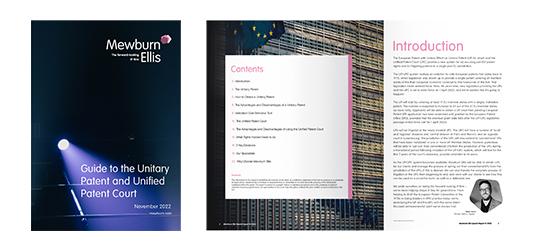
The Unified Patent Court (UPC) is now operational. As of June 1, 2023, patentees can enforce patents before the UPC across Europe and seek provisional measures such as preliminary injunctions — even ex parte, without the alleged infringer's defence being heard (Rule 212, UPC Rules of Procedure). UPC judges, especially from Germany and the Netherlands, are expected to generously apply provisional measures, considering every examined and granted patent as valid and enforceable via interim relief. Even when the parties are summoned to an oral hearing, strict time limits apply and preliminary injunction proceedings are set to result in a first-instance decision within a mere few weeks. There is therefore little to no room for mounting a robust defence. Consequently, the threat of a Europe-wide injunction being imposed within a short period or even without being heard at all poses a significant business risk for the defendant.
However, the UPC Agreement provides a protective measure to counteract these situations: the Protective Letter (Rule 207 UPC Rules of Procedure). This pre-emptive measure against potential infringement allegations aims to prevent an injunction being granted without the opportunity to present a defence. The UPC will hold a Protective Letter in custody for 6 months, similarly to a German protective brief, and the applicant will only be notified of its existence upon filing a UPC preliminary injunction request.
What advantage does a Protective Letter provide?
The Protective Letter can outline why the product doesn't infringe the patent, why the patent is invalid, and/or why granting a preliminary injunction would be disproportionate. Should an injunction request be made, the existence of a Protective Letter mandates the Court to arrange an oral hearing.
Parties are therefore strongly encouraged to file Protective Letters as part of their ongoing freedom-to-operate strategy. Indeed, as of June 26, the UPC had received ten times as many Protective Letters as it had pending cases.
A Protective Letter can thus play a pivotal role during the early stages of injunction proceedings, while often being quite cost-effective. The official filing fee is a modest 200 Euros and previous work conducted in analysing a competitor's patents can form the basis for a Protective Letter, often with minimal additional expenditure. For example, arguments and insights from an offensive opposition initiated against a patent at the European Patent Office (EPO) could be repurposed in the crafting of a Protective Letter.
Does opting out of the UPC's jurisdiction eliminate the risk of an unexpected preliminary injunction?
Both conventional European patents and the newly-introduced European patents with Unitary Effect can be enforced before the Unified Patent Court (UPC). However, a substantial number of conventional European patents, over half a million, have been opted out of the UPC's jurisdiction. This raises a question: does opting out of a patent grant a sense of security and eliminate the risk of an unexpected preliminary injunction being ordered by the UPC that could halt all sales across Europe's primary markets?
We propose that these inherent risks remain. The patentee holds the primary responsibility for deciding the jurisdiction for enforcement. Should they wish, the patentee can choose to withdraw the opt-out for a particular patent[1], thereby re-establishing the competence of the UPC. As soon as the withdrawal has become effective, the patentee is at liberty to file an action with the UPC. The process of withdrawing the opt-out and filing an action with the UPC will typically take only a few days. Therefore, an opt-out of a patent does not necessarily guarantee security. We maintain that filing a Protective Letter is a prudent step if the patent in question causes apprehension.
Can a Protective Letter be filed with the UPC if the patent is opted out?
We believe the answer to be affirmative. Under Article 47 of the UPC Agreement, an individual or entity can file a Protective Letter if they are entitled to initiate proceedings. Article 47(6) UPC Agreement states, "[a]ny other natural or legal person, or any body entitled to bring actions in accordance with its national law, who is concerned by a patent, may bring actions in accordance with the Rules of Procedure". While at first glance, this provision appears to negate the ability to file a Protective Letter if the patent is opted out, it is important to consider the purpose of the Protective Letter. Since the Protective Letter is designed to be effective if and when the patentee initiates an action at the UPC after its competence is re-established, we believe that the UPC should accept Protective Letters that are filed at a time when the patent is still opted out.
1 Unless an action has already been brought before a national court. See Article 83(4) UPC Agreement.
Find out more on our litigation page and UP & UPC page.
| |
The Unitary Patent and the Unified Patent Court - A guide
We can handle all aspects of litigation at the UPC, both offensive and defensive actions. |
Thomas works primarily in the biopharma sector, mainly with big pharma companies undertaking drug discovery and development. He advises on all stages of a drug’s lifecycle, from initial discovery through clinical trials to regulatory approval. Working closely with in-house IP teams and scientists, he has extensive experience of the prosecution and European opposition and appeal procedures as well as SPCs.
Email: thomas.wolter@mewburn.com
Sign up to our newsletter: Forward - news, insights and features
Our people
Our IP specialists work at all stage of the IP life cycle and provide strategic advice about patent, trade mark and registered designs, as well as any IP-related disputes and legal and commercial requirements.
Our peopleContact Us
We have an easily-accessible office in central London, as well as a number of regional offices throughout the UK and an office in Munich, Germany. We’d love to hear from you, so please get in touch.
Get in touch



